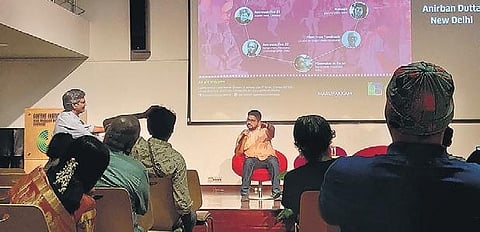

CHENNAI: Visuals of a mud hut with a small compound in front played on screen. An old man, shrivelled by age, sits near a bonfire smoking a beedi. He flicks it away, stands up and makes his way to the post office in Ajodhya, Siliguri, West Bengal. The post master prepares a bag of mail that needs to reach people in the neighbouring village. He seals it with wax, encrusts it with the government’s seal, and gives it to the old man.
“It’s about how all our jobs will be redundant at some point in time,” says Anirban Dutta, filmmaker, about his film The Last Run, which was screened at the 8th International Documentary and Short Film Festival held at the Goethe Institute, Max Mueller Bhavan, on Friday. It outlines the life of Kalipada Mura, one of the last surviving postal runners or Dak Haranar in Purulia, West Bengal. Alongside the life of a postal runner, the film runs a parallel story — one using shadow puppets, sharing the valour of postal runners when they delivered mail during the times of monarchy.
One of the issues highlighted in the film is the absence of job security for postal runners, who are paid daily wages and have to report to the post office for attendance every morning. It focuses on Kalipada’s personal life as well — like how his sons help him deliver the mail. His sons speak of the hilly terrain and how bicycles have made it easier for them to deliver the mail now. If any one of Kalipada’s sons are not available, he must walk at least 10 km to pass on the mail bag to the postman from the next village.
The film also shows Kalipada entering his rooster in a cockfighting tournament. “Apart from doing his job, Kalipada also finds ways to entertain himself. Cockfighting and smoking his beedi are a few,” said Anirban.
Many villages in West Bengal do not have a post office. They rely on the postal system of the closest village. People like Kalipada run close to 15 km over the rocky terrain, to pass on the bag of mail. A postman from the neighbouring village meets Kalipada at an agreed upon destination and time. Kalipada passes on the bag in exchange for the now-empty mail bag. If either one of them gets delayed, the mail is not passed on. The movie ends with Kalipada failing to meet the neighbouring village’s postman and is taken back home by his younger son.
The film ends abruptly without giving an insight into what happened after. We are left with several questions — would the mail get delivered the next day? Will Kalipada’s sons take up the profession? When asked about the ending, Anirban said, “I like the abruptness. There are many abrupt cuts present throughout the film. They are all very deliberately done. I like the effect; it leaves the audience questioning the possible outcome of Kalipada’s situation.”
Plot
The film depicts how the 72-year-old overcomes his weakened physicality, set in by age, to deliver a bag of mail that needs to be passed on to the next village.